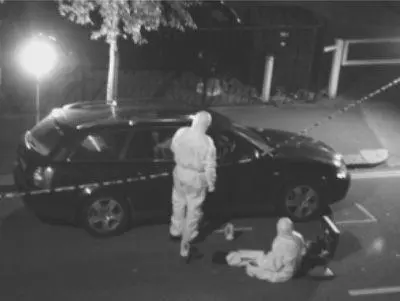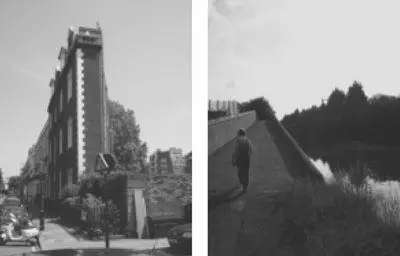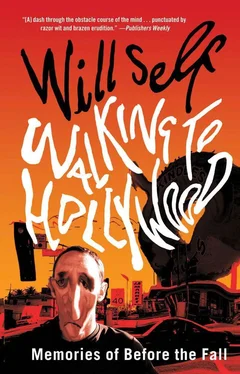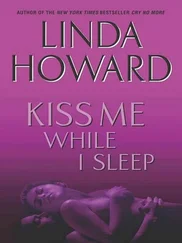Will Self - Walking to Hollywood
Здесь есть возможность читать онлайн «Will Self - Walking to Hollywood» весь текст электронной книги совершенно бесплатно (целиком полную версию без сокращений). В некоторых случаях можно слушать аудио, скачать через торрент в формате fb2 и присутствует краткое содержание. Год выпуска: 2011, Издательство: Grove/Atlantic, Inc., Жанр: Современная проза, на английском языке. Описание произведения, (предисловие) а так же отзывы посетителей доступны на портале библиотеки ЛибКат.
- Название:Walking to Hollywood
- Автор:
- Издательство:Grove/Atlantic, Inc.
- Жанр:
- Год:2011
- ISBN:нет данных
- Рейтинг книги:4 / 5. Голосов: 1
-
Избранное:Добавить в избранное
- Отзывы:
-
Ваша оценка:
- 80
- 1
- 2
- 3
- 4
- 5
Walking to Hollywood: краткое содержание, описание и аннотация
Предлагаем к чтению аннотацию, описание, краткое содержание или предисловие (зависит от того, что написал сам автор книги «Walking to Hollywood»). Если вы не нашли необходимую информацию о книге — напишите в комментариях, мы постараемся отыскать её.
Walking to Hollywood — читать онлайн бесплатно полную книгу (весь текст) целиком
Ниже представлен текст книги, разбитый по страницам. Система сохранения места последней прочитанной страницы, позволяет с удобством читать онлайн бесплатно книгу «Walking to Hollywood», без необходимости каждый раз заново искать на чём Вы остановились. Поставьте закладку, и сможете в любой момент перейти на страницу, на которой закончили чтение.
Интервал:
Закладка:

Mark Lester accompanied me to the end of the road and, standing either side of the crime scene tape, we said our goodbyes.
‘Look after your mother,’ I said as I kissed him on his greying blond curls. ‘She may be a little daffy, but she has a good heart.’
He removed my hand from his shoulder with professional courtesy, then enquired, ‘Will that be all, Mr Postlethwaite?’
Each purposeful stride kicked me free from the entanglements of my life, until a reveal shot done with the side of a Number 87 bus exposed the Wandsworth Road, its multicultural parade of food premises — The Sea Lamprey (Muslim fish and chips), Twice as Nice (Carribbean), El Golfo (Portuguese pasteleria ) — marching beneath yellowing London brick and the arched eyebrows of gothic rendering. I was safe now, walking out of town on a June morning — if I could be captured at all it would be possible only with a hand-held camera, fitted with a revolutionary lens capable of embracing the paradox of the human visual field, with its saccadic pans, zooms, tracks and stills spuriously contriving a synoptic unity.
The airy bulk of the gasometers, the heroic hulk of Battersea Power Station, the liberating span of Chelsea Bridge, the plane trees romping in the breeze along Sloane Street, the Michelin Man squatting on top of his building, the Linnaean façade of the Natural History Museum — the only disturbing note was struck by the branch of LA Fitness on Pelham Street, which, sited as it was beside the trompe l’œil Thurloe Square — a thin wedge of terrace hiding the District Line cutting — suggested movie trickery.
I didn’t let it get to me; after all, the familiar dumpy shapes of London cabs were wrapped around with the skyline of Hong Kong or Copacabana, and besides, Hyde Park had given way to Queensway, and I was already making my way through the backstreets of Notting Hill before the dump bins of newspapers outside the corner shops began to impinge, and I started to obsess about the weighty potential of Rhys Ifans’s scrotum. The shaggily mournful face of the Welsh comic actor stared up at me from newspaper after newspaper, on rack after rack, trapped there by the protracted and public break-up from his starlet girlfriend. He had come to prominence in Y-fronts and a snorkelling mask, typecast as an out-of-work Welsh comic actor in Notting Hill (1999). And so there his representation was, in the neighbourhood the representation of which had caused him to be so represented.
I pushed Ifans’s bare back against the artex wall and took the soft gristle of his nipple in my dogged teeth, while Notting Hill grabbed the adjustable wrench of Ernõ Goldfinger’s *Trellick Tower and whirled it around my head. I lurched through Meanwhile Gardens, and came to on a bench beside the Grand Union Canal, staring at the brown emulsion waters, the decrepitating plunge of a skateboarder in a half-pipe resounding in my ears.
As I headed west along the towpath the afternoon came puttering extended-play towards me — a broad stroke of sunlight painted by a narrow boat. Brawny young fishermen sat in the historic present: on empty milk crates, stripped to the waist to have it out with minnows, their six-packs of beer beside them, shiny as shell cases in the grass. And so by the time I reached Old Oak Common I had regained some kind of equanimity. All I had to do was maintain my course through the summery snowfall of dandelion spore and the giddy flip of the cabbage whites, not forgetting to duck when I saw Hal, sitting on a pole by the railway siding, or screwed into the masonry at the rear of the Car Giant warehouse, his brow knitted with pigeon-repelling barbs, a windscreen wiper for an eyelid. True, he might capture a few frames of me, but I doubted that I could be identified; I was merely a glyph in this panorama of subjects — bridge, lock, fisherman and lamp-post — which could be shuffled to produce an endless vista.
Morgan Freeman and Ron Howard were waiting for me where I’d arranged to meet them: beside an information board disfigured with graffiti tags. It wasn’t until I came right up to them that I could establish who it was they were playing, and then initially I thought Freeman hopelessly cast against type — like a black King Lear. However, within seconds it was clear not only that he was Nick Papadimitriou, but that he had captured my friend’s mien perfectly: the hands-on-hips-belly-out stance, the furious intensity of Nick’s stare and his slightly nasal whine.
As for Howard, I could never stand him anyway — and dying his hair red was cheap. Moreover, he was toting a large digital camera with a directional mike attached to it. Ignoring their greetings, I lashed out at him: ‘Why the fuck did you bring that?’ Then rounded on Freeman-as-Nick, ‘I told you to tell him not to bring a fucking camera — it’s crucial that there be no footage of me, if they get hold of it… What’s more, it ruins all this—’ I waved a hand at the enervated canal, the road bridge leapfrogging the canal, the empty skips piled like dirty crockery in a factory yard. ‘Now I can’t suspend disbelief in any of it!’
‘C’mon, Pete.’ Freeman, to his credit, refused to be intimidated. ‘Lighten up — if you don’t want to be filmed, that’s fine, John’ll keep you out of shot. He’s come along to film me, not you — you knew he was making this documentary about me.’
I splashed some water from the Evian bottle I was carrying into the palm of my hand and dashed it against my rage-engorged face. Freeman was wearing the same white shirt, dark trousers and heavy leather shoes that I’d last seen Nick in — but, while there was pathos in the half-mast flies, the shirtsleeves rolled up pre-war high, he still looked dapper. I realized my anger was born of pride as much as anything — I’d been counting on Thewlis playing me for these scenes with Nick. My self-esteem required that I be better-looking as well as younger.
Ron-John was cowering by the info-board, so I went over to him and did my best to sound contrite. ‘Look I’m sorry, John.’
‘It’s OK, Will, really — I understand. I’ll keep tight in on Nick, and if you want to examine the camera before I go that’s fine — besides, I’m only going to tag along for a couple of miles.’

The situation remained deeply unsatisfactory for all of us. Ron-John ran on ahead, took up a stance, then filmed Nick as he walked by, then he squeezed back past us and did the same again, over and over. He’d fitted Nick with a radio mike so he could indulge in his penchant for hymning such quotidiana as the abandoned warehouses along the canal side, the Middlesex County Council shields on the lock gates and the steel-clapboard Travelodge by the North Circular Road — but, although he launched into a lecture on the industrial estate conceived as the props department of capitalism, he kept being interrupted by passing joggers and cyclists, who upon noticing who he was stopped to natter among themselves.
I’d long since accepted Freeman’s performance — barely seeing him as African-American any more — and was infuriated by this gauche behaviour. As for Ron-John, no matter how ingratiating he was, or how many high-grossing movies he made, for me he’d always be the bat-eared sycophant in a letter jersey making up to Henry Winkler. When he offered me the camera for my inspection, rather than examining the playback, I simply removed the tape cassette and chucked it in the canal. He trudged away disconsolately over Horsenden Hill, while Morgan and I went on towards Northolt.
Читать дальшеИнтервал:
Закладка:
Похожие книги на «Walking to Hollywood»
Представляем Вашему вниманию похожие книги на «Walking to Hollywood» списком для выбора. Мы отобрали схожую по названию и смыслу литературу в надежде предоставить читателям больше вариантов отыскать новые, интересные, ещё непрочитанные произведения.
Обсуждение, отзывы о книге «Walking to Hollywood» и просто собственные мнения читателей. Оставьте ваши комментарии, напишите, что Вы думаете о произведении, его смысле или главных героях. Укажите что конкретно понравилось, а что нет, и почему Вы так считаете.












